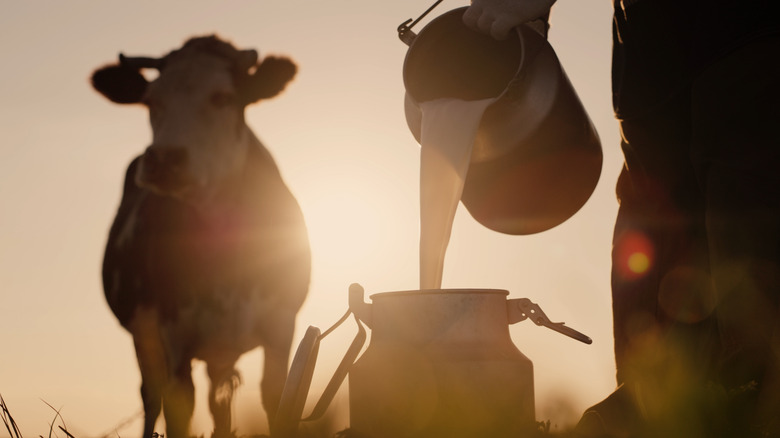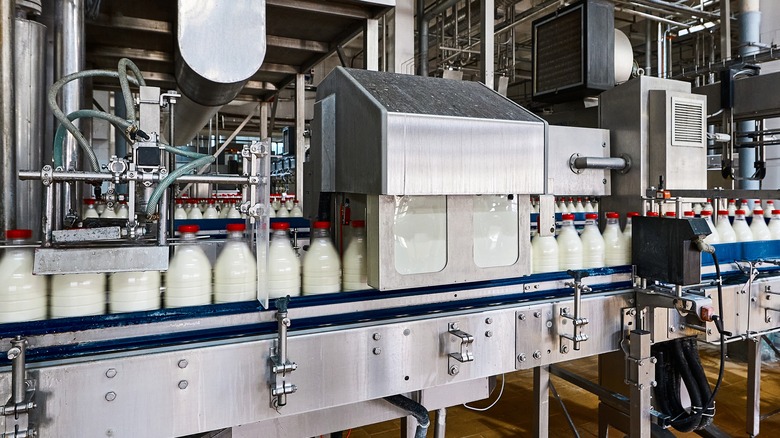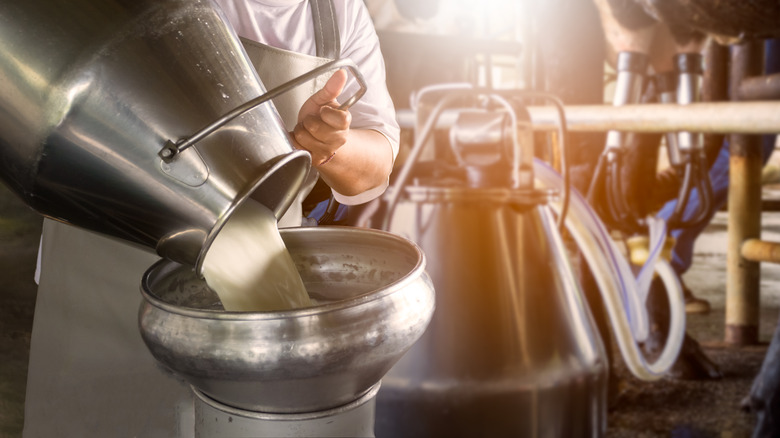Why One Controversial Milk Is Banned In Some Parts Of The US
We may receive a commission on purchases made from links.
Many foods that are banned from consumption in the United States are unfamiliar to the average American. You can't eat the toxic Ackee fruit, nor can you sip on real root beer with sassafras, per Restaurant Clicks. Americans can't dive into a plate of the traditional Scottish dish haggis, as sheep lungs are banned for human consumption, the shark's status as an endangered species has made consuming shark finds illegal, you can't slice off a hunk of the maggot-infested casu marzu cheese, and you can't eat horse meat. According to Reader's Digest, the Kinder Surprise egg, which features a prize hidden inside its chocolate exterior, is prohibited because it's illegal to put inedible items inside of food.
Reader's Digest also tells us that in certain U.S. states, it is illegal to sell unpasteurized milk. Though the debate surrounding raw milk rages on, there are a number of health risks associated with drinking milk that has not been pasteurized.
The process of pasteurization
According to MasterClass, the concept of pasteurization was invented by the French scientist Louis Pasteur in 1864. He found that heating wine could kill potentially harmful bacteria. In 1886, chemist Franz von Soxhlet suggested that milk could be pasteurized.
Today, the standard process for pasteurizing milk involves heating chilled raw milk to a temperature of 161 degrees Fahrenheit for approximately 15 seconds, per U.S. Dairy. The milk is then immediately chilled back down to 39 degrees Fahrenheit. Often, dairy processors will use the heat radiating from the already pasteurized milk to warm up the still-cold raw milk and cool down the warm milk with chilled pasteurized cold milk, in order to save energy.
The National Conference of State Legislatures tells us that raw milk can be legally sold outright in 31 states. In many states, you can only buy unpasteurized milk at the farm on which it is produced. But in 12 states, raw milk is available for purchase in retail stores, and 19 states have banned the sale of unpasteurized milk.
Raw milk can carry disease
There are a number of reasons why you might want to avoid drinking unpasteurized milk. According to the Center for Disease Control, between 2013 and 2018, disease outbreaks associated with drinking raw milk was more common in states where it was legally available for purchase. As the U.S. Food and Drug Administration explains, "Raw milk can carry dangerous bacteria such as Salmonella, E. coli, Listeria, Campylobacter, and others that cause foodborne illness, often called "food poisoning."
In 2017, New York's Vulto Creamery was forced to recall their raw milk-based cheese after it caused a listeria outbreak linked to two deaths and six hospitalizations. A New Jersey woman contracted Brucella RB51 from unpasteurized Udder Milk, despite the fact that the sale of raw milk is illegal in the state.
Despite the health risks, there are many people who continue to advocate for lifting the ban on selling raw milk. In a 2015 article, NPR interviewed Illinois dairy farmer Joe Zanger, who sold unpasteurized milk on his farm despite the state's prohibition. Zanger said, "The free market has taken us so far already. If you come out to my farm and you see something you don't like that makes you not want to buy my milk, you have every right to say, 'No, thanks.' If everything looks appropriate, why can't you buy it?" Apparently, Zanger got his wish. Illinois' Joint Committee on Administrative Rules legalized on-farm raw milk sales in early 2016.


